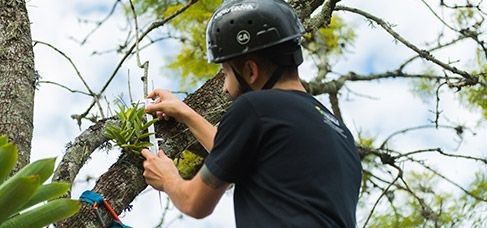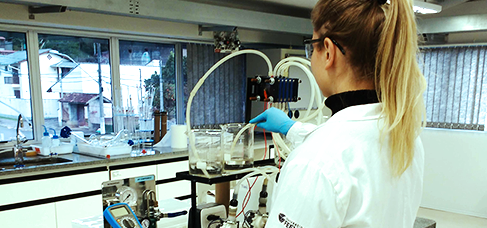The Postgraduate Program in Environmental Quality, which conducts advanced studies that aim at solving environmental problems, is part of the Environmental Sciences area of CAPES.
Application
The international selection process is carried out in a continuous basis, meaning the international student can apply at any time. The first step to enroll in the course is to get in touch with one of the professors listed below in order to align the research project to be developed. Once this step is done, it is necessary to send an e-mail to strictosensu@feevale.br, containing the documentation described in the item below.
Advising Professors
The orientations will be conducted in the English language. You can find below a list of the advising professors and their areas of expertise.
Annette Droste
Coordinator of the Postgraduate Program in Environmental Quality
PhD in Genetics and Molecular Biology
Areas of expertise: environmental genotoxicity; biotechnology and ecophysiology of plant resources
Research Line: Environmental Technologies and Intervention
Email: annette@feevale.br
Phone number: +55 51 3586 8800 - extension 8847
Fernando Rosado Spilki
PhD in Genetics and Molecular Biology
Areas of expertise: Micro-organisms as environmental impact markers
Research Line: Integrated Environmental Diagnosis
Email: fernandors@feevale.br
Phone number: (51) 3586 8800 - extension 9284
Rafael Linden
PhD in Cell and Molecular Biology
Areas of expertise: Biomarkers of exposure to environmental and occupational toxicants and damage to health; Epidemiology of effluents for evaluation of drug use and population health.
Research Line: Integrated Environmental Diagnosis
Email: rafael.linden@feevale.br
Phone number: (51) 3586 8800 - extension 9039
Vanusca Dalosto Jahno
PhD in Medicine and Health Sciences.
Areas of practice: recycling and degradation of materials
Research Line: Environmental Technologies and Intervention
Email: vanusca@feevale.br
Phone number: (51) 3586 8800 - extension 8948
DOCUMENTS FOR APPLICATION
- Registration form available on the website;
- Curriculum Vitae that shows the entire academic and professional trajectory;
- ORCID ID;
- Copies of academic publications from the last five years;
- Research project;
- Translated copy (simple translation) of the master's or graduation diploma;
- Photo 3x4cm;
- Copy of passport;
- Indication of a tutor from Feevale University.
PROFICIENCY
By the end of the third year international students must provide proof of proficiency in Portuguese AND in one of the following languages: English, Spanish, French, German or Italian. Both the Portuguese language and the other language chosen must have a minimum grade of B2 of the Common European Framework of Reference for Languages. Please consults us to check the accepted tests. Feevale University also carries out online proficiency tests in Portuguese and in English, upon request.
SELELCTION PROCESS
The classification in the selection process will be processed by the course committee and will be carried out based on the documentation sent by email. The approved student will be contacted by email and will receive a letter of acceptance.
ENROLLMENT
Once approved the students should proceed with the enrollment in the course, which can be done online by sending the additional documents below to the email strictosensu@feevale.br:
- Copy of proof of residence;
- Copy of birth or marriage certificate.
PASSPORT AND ENTRY REQUIREMENTS
To enter Brazil, every international student needs a passport issued by his/her government. The student must also provide the Temporary Visa IV with the Brazilian Embassy in his/her country, at which time the letter of acceptance of the doctorate course must be presented.
Tuition Fees
Please get in touch with us by email strictosensu@feevale.br for more information.
GENERAL PROVISIONS
- International students must stay at least one semester in person at Feevale University (March to June or August to November). The student must complete the course in a minimum of two years and a maximum of four years.
- The course will be carried out in a hybrid way, online and in person, and the definition of the periods that will be held at the Feevale University will be determined by the coordination of the course along with the tutor and the student.
- The student may request to make use of the credits obtained in the master's degree by presenting the subjects' syllabus with the hourly load. This request must be directed to the email strictosensu@feevale.br.
- Disciplines for international students will be offered in English.
- The advisor should be from Feevale University, and external professors may act as co-advisors.
- Orientations can be done online.
- Up to 12 months before the end of the course the qualification of the doctoral thesis must take place.
- The defense of the doctoral thesis can be done online (by web conference), or face-to-face, at Feevale University.
AREA OF CONCENTRATION: ENVIRONMENTAL QUALITY
The area of concentration understands the environment as a complex totality that, due to its systemic character, suffers the effects of the interrelations established among the abiotic (air, water, and soil), the biotic (living beings) and the anthropic environments.
Evaluation or diagnosis is the starting point for the investigation of the effects of different variables found in living organisms or in the maintenance of the interrelationships of these organisms with each other or with the abiotic environment in a given time and space. At the same time, diagnosis leads to the development of technologies and interventions that make it possible to prevent, mitigate or control the impacts generated by anthropic activities.
OBJECTIVES
- Develop research related to the environment, focusing on environmental diagnosis and on the proposal of technologies for intervening in and solving environmental problems;
- Qualify researchers and professors with a markedly interdisciplinary and innovative profile;
- Generate scientific-technological knowledge and propose solutions to problems caused by the use of natural resources which are results of industrialization and urbanization;
- Develop methods of environmental diagnosis that integrate, in an interdisciplinary way, physical, chemical, biological, and socioeconomical dimensions;
- Correlate environmental indicators with the health conditions of the population, thus, contributing to their safety and well-being;
- Promote, through the dissemination of knowledge, environmental quality and, consequently, life quality within the Sinos River Basin by means of diagnostic, intervention, and education.
TARGET AUDIENCE
Professionals from the areas of Health Sciences, Exact and Technological Sciences, Humanities, and Applied Social Sciences who wish to develop the advanced research proposed by the lines of research of the program and to propose solutions to problems related to environmental issues.

AREAS OF STUDY
- Biology and environmental biotechnology;
- Environmental chemistry;
- Water resources and environmental sanitation;
- Recycling of materials;
- Applied probability and statistics;
- Environmental law;
- Atmospheric monitoring;
- Environmental factors and human genetics;
- Microorganisms as markers of environmental impact;
- Ecology, botany, and environment;
- Limnology and water resources management;
- Genetics, molecular biology, and environmental mutagenesis;
- Materials science and waste treatment;
- Environmental perception and education;
- Environment and health damage;
- Pulmonology and environmental factors;
- Environmental management;
- Solid waste.

PROFESSIONAL PROFILE
The Master's and Doctoral courses in Environmental Quality aim at training human resources who are capable of applying and producing scientific knowledge in the areas of environmental monitoring and diagnosis. In addition, these professionals should foster the creation of new technologies and methodologies applicable to the mitigation of environmental impacts, cleaner production tools, waste management, and environmental awareness and education.
Public Notice
-
Nenhum registro encontrado.
History
The Master’s Program in Environmental Quality was created in 2004 due to strong popular demand in the region and to the concern and interest of the Feevale University in investing in the training of human resources at postgraduate level in Environmental Sciences, thus, enabling the integration of knowledge in research, scientific production, teaching, extension, and innovation. The Master’s Program started in April 2005 approved by CAPES Official Letter n. 520/2004/CTC/CAPES. The Program strongly focuses on environmental and social issues in the Sinos River Valley region, where the institution is located. It also has the purpose of providing tools for investigating environmental related issues in other regions and of meeting the regional demand for postgraduate professionals trained in diagnosis and interdisciplinary management of environmental issues. Thus, the doctoral program was created, accredited by CAPES in 2009 by Official Letter n. 8/2009/CTC/CAAIV/CGAA/DAV/CAPES.
The Postgraduate Program in Environmental Quality is part of the Environmental Sciences, having received the highest score (5) granted by CAPES in a triennial evaluation. The Program has been focused on being a reference to research and critical reflection on the current approach of what environmental quality is, as well as on strengthening its role in the training of human resources for dealing with environmental issues.
Coordinating Staff
Coordinator: Daniela Müller de Quevedo.
Substitute Coordinator: Haide
Maria Hupffer.
Full Faculty Representative: Jairo
Lizandro Schmitt.
Full Faculty Representative: Marco
Alesio Figueiredo Pereira.
Full Faculty Representative: Daiane
Bolzan Berlese.
Full Faculty Representative: Luciano
Basso da Silva.
Full Faculty Representative: Annette
Droste.
Full Faculty Representative: João
Alcione Sganderla Figueiredo.
Master’s Student Representative: Lennon
Gabriel Ribas Severo.
Doctoral Student Representative: Jenifer
Panizzon.
Self-evaluation Committee
Teaching Representative: Annette Droste, Daniela Müller de Quevedo e Jairo Lizandro Schmidt.
Student Representative: Gabriela Zimmermann Prado Rodrigues.
Egress Representative: Gustavo Marques da Costa e Rodrigo Staggemeier.
Admnistrative Technician Representative: Jordana de Oliveira.
Joint Doctoral
Sandwich Doctoral Program Abroad (PDSE / CAPES)
The Sandwich Doctoral Program Abroad (PDSE) aims at supporting high-level human resources training by granting Higher Education Institutions with PhD courses recognized by CAPES scholarships quotas for sandwich doctoral students. The research internship abroad should contemplate, primarily, knowledge areas less consolidated in Brazil.


